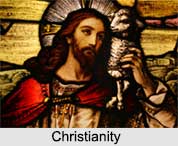 Sects of Christianity are held together by one teacher who promotes the unique doctrine. Christians are divided into 2 sects - the Catholics and the Protestants. The former may be considered as the traditionalists and the latter the reformists. The two are divided mainly on the question of the authority of the Church.
Sects of Christianity are held together by one teacher who promotes the unique doctrine. Christians are divided into 2 sects - the Catholics and the Protestants. The former may be considered as the traditionalists and the latter the reformists. The two are divided mainly on the question of the authority of the Church.
Catholic Denomination
The Catholics believe that the Church is the manifestation of God"s Kingdom on earth and the Mystical body of Jesus Christ. God reveals his truth through it. The Church and its sacraments are therefore a must for the redemption of men. The Sacraments are the seven solemn religious ceremonies in the Christian Church; i.e., Baptism, Confirmation, Eucharist, Confession, Matrimony, Holy Orders and Anointing of the Sick which are believed to be accompanied by great spiritual benefits. The pope who is the head of the Church as well as the priests and the bishops are believed to possess a divine authority.
By receiving baptism one becomes a member of the Catholic Church. Catholics are divided into Roman Catholics and Eastern Orthodoxy. Sometimes the word Catholic is claimed to be exclusively used for a member of the Roman Catholic Church. Roman Catholic Church was founded by the Head of the disciples of Jesus, St. Peter. Other eastern Churches that accept the supremacy of Pope over them also are considered Roman Catholics; only their traditions are different. But there are also other eastern Catholic churches that reject the supremacy of Pope and the authority of the Roman Catholic Church.
Protestant Denomination
As against Catholics, Protestants do not accept the Supreme authority of the Church. They hold that man can directly establish his relation to God. He is directly responsible to God and the mediation of Church is not needed for him. The Bible is the only sure source of Christian faith and practice and only the authority of the Bible is to be accepted. Jesus is the sole authority and Messiah of God and his power is not vested in the Pope and the priests. The clergy has achieved unauthorized domination over the people and it must be wiped out. Thus it is a reform movement and a protest against the false domination of the church and its priests over the people. They speak of 2 things as guiding principles - justification by faith and infallibility of the Bible. The Protestants deny the infallibility of the Pope and the veneration of images of Virgin Mother Mary and saints.
Amongst Protestants also there are various sub-sects, three of which are associated with the names of great protestant reformists - Martin Luther, Calvin and Zwingli. Thus we have the groups called Lutherans, Calvinists and Zwinglians respectively.
Luther protested against some of the practices in Catholic Church like sale of indulgences, rejected the papal authority and preached the supremacy of the Bible and raised a kind of "Back to Bible" slogan. He called on each individual to read the word of God for himself and make his part of redemption self-guided. Calvin was also against the role of mediation of the Church but laid great emphasis on the grace and gift of God instead of individual freedom to choose one"s own path in the light of Biblical teachings.
Apart from these groups there are innumerable other Christian groups. The Anglicans also form a part of the Christian fold.









